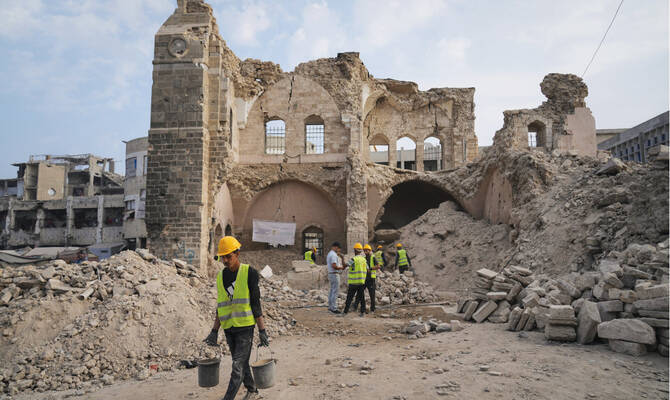ANKARA: Following Greek Prime Minister Kyriakos Mitsotakis’ address to the US Congress last month, long-running tensions between Turkey and Greece are flaring up again.
As both countries simultaneously face an economic downturn with severe inflation, and as they near their election terms in 2023, experts say that tension between them is being increasingly used for domestic purposes.
Writing several tweets in the Greek language, Turkish President Recep Tayyip Erdogan has directly threatened the Greeks to be prudent with their standpoint in the Aegean Sea, otherwise “they will regret” it.
Erdogan recently said that Mitsotakis “no longer exists” for him as he accused him of trying to prevent the sale of F-16 fighter jets to Turkey. He also warned: “Don’t try to dance with Turkey. You’ll get tired and stuck on the road.”
In return, the Greek government called for national unity toward an “unpredictable” neighbor, while former Prime Minister Alexis Tsipras replied to Erdogan in Turkish, saying: “Greece will protect its sovereignty against all threats. So let’s end the provocation and get back to dialogue on the basis of international law. The answer to the economic crisis we are all facing is not extreme nationalism.”
Mitsotakis also warned against the “aggressiveness” of Turkey and said he will not “be involved in a game of personal insults.”
For Soner Cagaptay, a senior fellow at Washington Institute, this recent tension is unprecedented.
“Erdogan issues a warning to Greece over Aegean Sea disputes, threatening a repeat of the Asia Minor Catastrophe of 1922 in which Greece was brutally defeated by Turkey. This is the most serious escalation of tensions between Ankara and Athens in recent memory,” he said.
After issuing several statements over recent weeks urging for common sense to prevail in the Turkey-Greece conflict and throwing his weight behind Athens, German Chancellor Olaf Scholz visited the Greek port city of Thessaloniki on Friday as part of the South East European Cooperation Process.
“The latest tensions in the East Mediterranean between Turkey and Greece are part of an interlinked and long-lasting set of crises determined by the conflicting views on what each country defines as national interests and national sovereignty,” Madalina Sisu-Vicari, an energy and geopolitics expert at Eurasian Energy Chamber, told Arab News.
Ankara emphasizes the need for the demilitarization of Greek islands neighboring Turkey in the Aegean Sea on the basis of international agreements as it sees the presence of Greek military forces there as a threat to its own domestic security.
Ankara is also against the involvement of NATO, the EU or third parties in the pending maritime issues in the Aegean Sea, such as overlapping claims on the continental shelves, maritime boundaries, illegal migration and Cyprus, as it seeks their resolution bilaterally.
Selim Koru, an analyst at Ankara-based think-tank TEPAV, says a technical solution through multilateral organizations like the EU and NATO could slow down the crisis but will not stop it.
“This crisis is the manifestation of a deep political process that has been unfolding for decades. It has a rationale of its own and won’t stop until it has run its course,” he told Arab News.
For Ankara, islands in the Aegean Sea were given to Greece under the Lausanne Treaty in 1923 and the Paris Treaty in 1947, which guarantee the islands’ unarmed status.
But Greece considers it its sovereign right to maintain its army there to defend against any hostile actions of Turkey’s army along the same shores.
Both countries also notified the UN about their positions on the islands, with some historians like Ryan Gingeras saying that “a war in the Aegean is not only possible but perhaps, at some point, probable.”
According to Sisu-Vicari, these maritime crises have been translating into many geopolitical confrontations and power struggles between Ankara and Athens, and they have been regularly revived or amplified by important developments, both domestic and international.
“Domestic factors such as economic difficulties and next year’s elections, in conjunction with Turkey’s reckoning about her geopolitical role and leverage in the context of the Ukraine war, were likely among the principal triggers of Ankara’s latest rhetoric,” she said.
However, other than the domestic factors, Sisu-Vicari thinks that the scaling down of the US geopolitical clout in the East Mediterranean — now even more amplified by the war in Ukraine — has impacted the Turkish-Greek crisis.
“On one hand, the EU’s membership perspective is frozen for Turkey, and the US has downsized its geopolitical presence in the East Mediterranean, and on the other, the interest of other European actors is mainly absorbed by the war in Ukraine,” she said.
In October 2020, Greece and Turkey decided to establish a military deconfliction mechanism following a series of talks in Brussels facilitated by NATO. The mechanism aimed at reducing the risk of “accidents” and “incidents” in the East Mediterranean by creating a hotline between the two counties.
But the exploratory talks that resumed last year made little progress. Turkey recently canceled a High-Level Strategic Council meeting with Greece.
Although it could help to ease some of the tensions, Sisu-Vicari thinks that it is difficult to see these long-lasting crises solved without a “grand bargain” in the East Mediterranean, which should include a visionary plan for the region and political concessions — perhaps painful — agreed upon by the principally concerned actors, Turkey and Greece.
“In the absence of such bargain, domestic or geopolitical factors would continue to revive and amplify the tensions,” she added.
The US State Department urged both allies to “avoid rhetoric that could further raise tensions.”
“Greece and Turkey are both strong partners and key NATO allies to the US and sovereignty and territorial integrity of all countries should be respected and protected,” it said in a statement.
Turkey’s largest military exercise, EFES-2022, which began on May 20, was concluded on June 10 with the participation of over 10,000 military personnel from 37 nations, including the US, the UK, France, Qatar and Pakistan — a move considered timely and significant amid rising regional tensions.

















